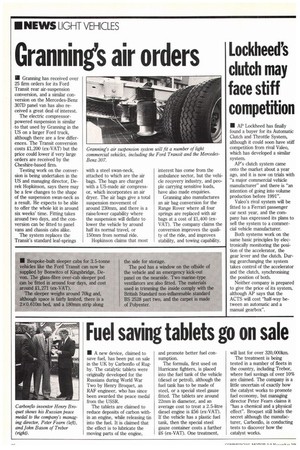Fuel saving tablets go on sale
Page 24

If you've noticed an error in this article please click here to report it so we can fix it.
• A new device, claimed to save fuel, has been put on sale in the UK by Carbonflo of Rugby. The catalytic tablets were originally developed for the Russians during World War Two by Henry Broquet, an RAF engineer, who has since been awarded the peace medal from the USSR.
The tablets are claimed to reduce deposits of carbon within an engine, while releasing tin into the fuel. It is claimed that the effect is to lubricate the moving parts of the engine, and promote better fuel consumption.
The formula, first used on Hurricane fighters, is placed into the fuel tank of the vehicle (diesel or petrol), although the fuel tank has to be made of steel, or a special steel gauze fitted. The tablets are around 22mm in diameter, and an average cost to treat a 2.5-litre diesel engine is £56 (ex-VAT). If the vehicle has a plastic fuel tank, then the special steel gauze container costs a further £6 (ex-VAT). One treatment, will last for over 320,000km.
The treatment is being tested in a number of fleets in the country, including Trebor, where fuel savings of over 10% are claimed. The company is a little uncertain of exactly how the catalyst works to promote fuel economy, but managing director Peter Fearn claims it "has a chemical and a physical effect". Broquet still holds the secret although the manufacturer, Carbonflo, is conducting tests to discover how the catalyst works.
























































